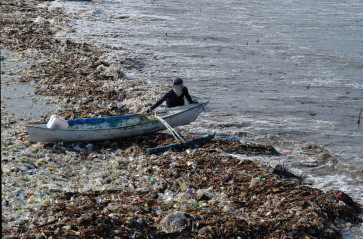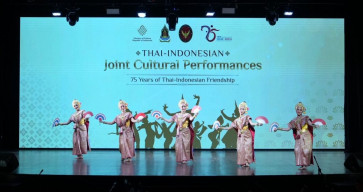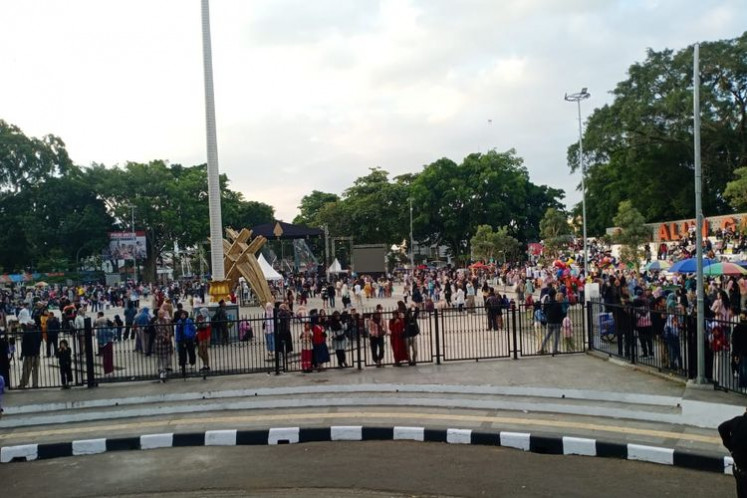Popular Reads
Top Results
Can't find what you're looking for?
View all search resultsPopular Reads
Top Results
Can't find what you're looking for?
View all search resultsOutlook 2019: Indonesia faces decisive year ahead of 2020 Tokyo Olympics
Proud moment: Indonesia shuttlers Kevin Sanjaya Sukamuljo (left) and Marcus Gideon share the podium after winning the 2018 Asian Games men’s doubles gold medal in Jakarta on Aug
Change text size
Gift Premium Articles
to Anyone
P
roud moment: Indonesia shuttlers Kevin Sanjaya Sukamuljo (left) and Marcus Gideon share the podium after winning the 2018 Asian Games men’s doubles gold medal in Jakarta on Aug. 28, 2018. (JP/Seto Wardhana)
New year, new plan.
After a stellar performance in a year full of sports, Indonesia is looking to 2019 to get in shape for greater achievements yet at the 2020 Olympic Games in Tokyo.
Indonesia ended 2018 with flying colors, successfully hosting the Asian Games and Asian Para Games and coming fourth (with 31 gold medals) and fifth (35 golds) respectively. With that in mind, national stakeholders in sports will strive to maintain that momentum this year and in the following one.
As for multisport events, Indonesia will only join the 2019 Southeast Asian (SEA) Games this year, which will be held in the Philippines in November and December. Nevertheless, certain athletes will take part in qualifiers for the 2020 Olympics, which is the top priority for Team Indonesia.
Throughout Indonesia’s history of participating in the quadrennial Summer Games, the country has only seen its athletes make it onto the Olympic podium in archery, badminton and weightlifting.
Indonesia’s Olympic journey began in 1952 with the Helsinki Games.
Up until the 2016 Olympics in Rio de Janeiro, Indonesia has collected a total of seven gold, 13 silver and 12 bronze medals.
In the medal tally, archery led the way with a silver awarded to the women’s trio of Lilies Handayani, Nurfitriyani Saiman and Kusuma Wardhani at the 1988 Seoul Olympics in South Korea. That was the first and last medal in archery for Indonesia.
Badminton contributed the lion’s share of Olympic gold for Indonesia, and — with the exception of the 2012 London Games — the country has always brought home at least one medal in this sport since Susy Susanti and Alan Budikusuma, respectively, won gold in the women’s singles and men’s singles competition at the 1992 Barcelona Olympics.
The 2012 Olympics was a bit of an upset after Tontowi Ahmad and Liliyana Natsir lost a battle for bronze to Denmark’s Christina Pedersen and Joachim Fischer Nielsen.
Alongside badminton, weightlifting is another sport where Indonesia has tended to shine at the Olympic level. Lifting the country’s self-confidence at international sporting events, Lisa Raema Rumbewas bagged the first Olympic silver at the 2000 Sydney Games. At the time, Lisa was only 20 years of age and entered the competition as the underdog.
In the two following Olympics in Athens in 2004 and in Beijing in 2008, Lisa nailed another silver and bronze, positioning the country as a force to be reckoned with in weightlifting.
Indonesia has won at least one gold medal in each Olympics after the Barcelona event.
At the upcoming Games in Tokyo, Indonesia is likely to rely once again on badminton and weightlifting.
According to a document on the preparations for the SEA Games and the Tokyo Olympics obtained by The Jakarta Post, the Youth and Sports Ministry aims to get at least 30 athletes to qualify for Tokyo.
Rifda Irfanaluthfi (JP/Seto Wardhana)Besides badminton and weightlifting as the mainstay, the mountain bike discipline in cycling as well as skateboarding and climbing are in the ministry’s focus for the 2020 event.
As for gold medals from the 2020 Games, Indonesia has pinned its hopes on the duo of Kevin Sanjaya Sukamuljo and Marcus Fernaldi Gideon in badminton as well as on Eko Yuli Irawan and Sri Wahyuni in weightlifting.
The world number-one pair of Kevin and Marcus has shown a consistently stellar performance, winning eight tournaments in 2018. Their consistency will be tested this year at prestigious tournaments such as the World Championship and the Sudirman Cup, a biennial world mixed team championship.
Eko, who shifted to the men’s 61-kilogram category for the Tokyo Games from 62 kg, proved his mettle in the new category by winning gold at the 2018 World Weightlifting Championships in Ashgabat in November.
Besides the aforementioned favorites, Indonesia is keeping fingers crossed for other sports at the 2020 Games.
Gymnast Rifda Irfanaluthfi has the chance to qualify for the Olympics despite a tight competition in the qualification round. The 18-year-old Asiad silver medalist took part in the World Artistic Gymnastics Championship in Doha last October, an Olympic qualifier, but she failed to nab a ticket for the Games.
Rifda’s score was still too low, and it was surely a tight competition with big names like Simone Biles from the United States taking part.
Rifda still has a shot at representing Indonesia at the Olympics by participating in another qualifier this year, the 2019 World Artistic Gymnastics Championships in Stuttgart, Germany, in October. The Stuttgart stint is likely to be less competitive, as some of the top names qualified for Tokyo will not participate.
Meanwhile, sport climbing and skateboarding, two sports debuting at the Olympic Games in Tokyo, offer the chance for a surprise.
While taking the 2020 Games seriously, Indonesia will not take the Philippines SEA Games lightly, with sports minister Imam Nahrawi saying he would treat the biennial multisport event as the perfect platform to grind junior and second-tier athletes in the elite program.
Imam said he would officiate the plan by issuing a ministerial regulation ordering sport federations to deploy the said athletes to the 2019 SEA Games, which also would facilitate regeneration in Indonesian sports.
_______________________
Road to 2020 Olympics Games
Tokyo
July 24 – Aug. 9, 2020
Priority sports
Archery, track and field, badminton, cycling-BMX, rowing, weightlifting, karate, tennis, taekwondo, canoe, skateboard, beach volleyball, shooting, artistic gymnastics, shooting and boxing.
Gold medal targets
Two gold medals from badminton men’s doubles and weightlifting men’s 61 kilogram or women’s 49 kg
Budget
Each athlete needs Rp 1.9 billion to be properly prepared for the Tokyo Games. That budget includes spending for domestic and overseas training as well as participating at international tournaments and Olympic qualifier events.
Number of athletes targeted to qualify: 30
Source: Youth and Sports Ministry











